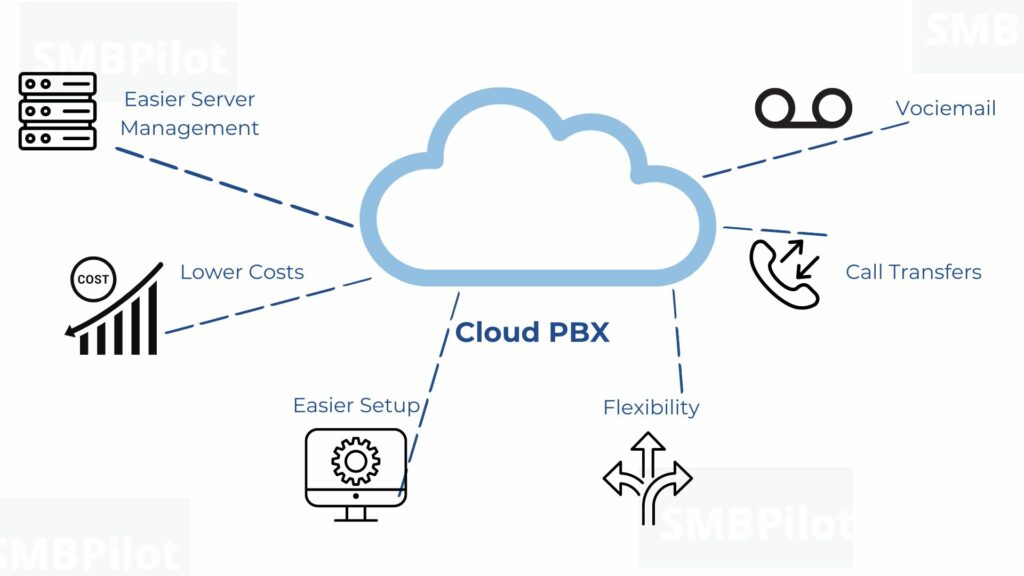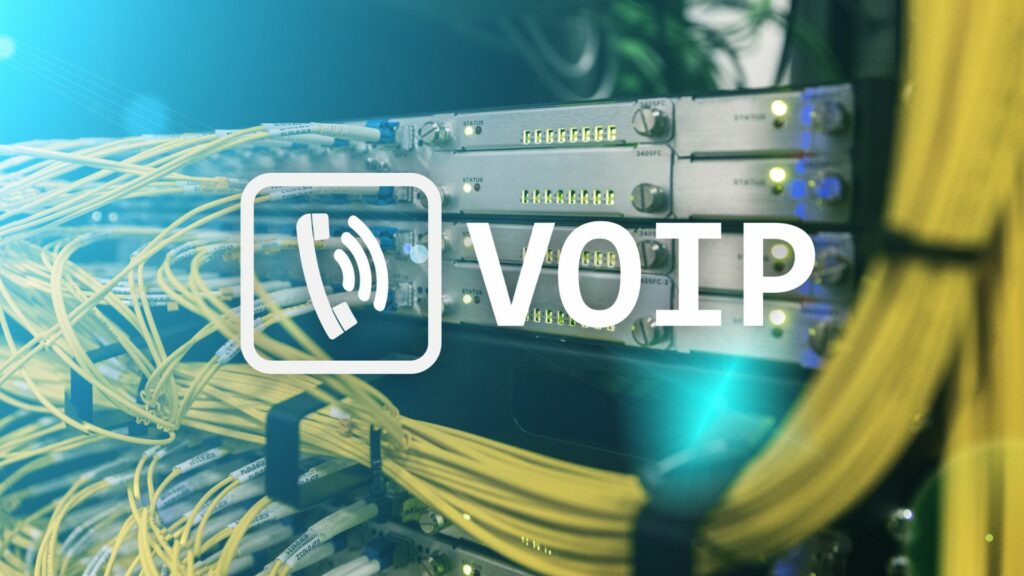Businesses face significant challenges in managing their communication systems in the digital age. Traditional phone systems can be expensive, inflexible, and difficult to scale, limiting a company’s ability to adapt to changing demands and to communicate effectively with clients and remote teams.
Imagine the frustration of dealing with dropped calls during critical negotiations or the high costs of upgrading hardware every time your business needs change. Not to mention the complexities and technical challenges of maintaining a conventional PBX system.
Enter Cloud PBX – a modern solution that transforms your business communications. Cloud PBX is hosted entirely over the Internet and offers a flexible, scalable, and cost-effective alternative. With no physical infrastructure, it reduces overhead costs and simplifies management. Plus, it enhances your team’s ability to collaborate from anywhere globally, ensuring that your business stays connected and agile in a competitive marketplace.
What is a Private Branch Exchange (PBX)?
A Private Branch Exchange (PBX) is a private telephone network used within an organisation to manage inbound and outbound calls and communications. This system connects the internal telephones of a company to the public switched telephone network (PSTN), providing a range of functionalities.

Definition
A PBX allows businesses to leverage numerous extensions from a single phone line, eliminating the need for separate lines for each user. It is a cost-effective and flexible solution for handling a company’s communication needs. Traditional PBX systems require on-premise hardware and maintenance, but with advancements in technology, cloud-based PBX solutions have emerged, offering greater scalability and features.
Functionality
The functionality of a PBX system includes:
- Routing incoming calls to the appropriate extension or department.
- Facilitating internal call transfers between employees.
- Offering call features like voicemail, call recording, conference calling, and IVR (Interactive Voice Response).
- Allowing outbound calls through a network of lines.
Additionally, modern PBX systems, particularly Cloud PBXs, bring advanced features such as video conferencing, integration with mobile devices, and internet-based calling using Voice over Internet Protocol (VoIP) technology.
| Feature | Traditional PBX | Cloud PBX |
|---|---|---|
| Hardware Requirements | Requires expensive onsite hardware | No onsite hardware needed; operates entirely in the cloud |
| Cost of Updates | Frequent additional fees for service and upgrades | Automatic updates provided at no additional cost |
| Technical Support | Often requires costly, specialised technical support | Simple and easy to manage without specialised skills |
| Scalability | Scaling up can be complex and costly | Easily scalable; add or remove extensions as needed |
| Mobility and Flexibility | Migration and remote setup can be challenging | Designed for flexibility and remote work |
Cloud PBX systems have gained popularity due to their ability to offer extensive communication capabilities without the hefty upfront costs and maintenance fees associated with a traditional, hardware-centric PBX. Businesses benefit from high levels of reliability, improved customer service, and the agility to adjust as the organisation’s needs evolve.
How Does a Cloud PBX Work?
Cloud PBX, or Cloud-based Private Branch Exchange, is essentially a virtual phone system hosted and managed by a third-party service provider via the internet. Renowned for its flexibility, a Cloud PBX operates independently of traditional phone lines and hardware systems. Here’s how this innovative technology functions:

Overview of a Cloud-based Phone System
A Cloud PBX works by harnessing the power of the internet to deliver voice, video, and other communications. It does this through converting data into packets and transmitting them over the internet. Unlike the conventional PBX that requires physical wiring, Cloud PBX stores data in secure, off-site data centers. Users access the system through a web interface or an app on a mobile device or desktop.
The system links to traditional PSTN lines via VoIP technology, ensuring compatibility with traditional phone users. Elegant in its simplicity, a Cloud PBX seamlessly integrates with mobile phones, desk phones, and computers — providing a broad array of communication tools without the need for expensive hardware.
Role of the Internet Connection in a Cloud PBX
The internet connection is the lifeline of a Cloud PBX system. As everything is hosted online, the quality and reliability of the internet connection directly impact the performance of the phone system. High-speed and stable internet is crucial for clear conversations, high-quality video conferencing, and uninterrupted service. Good bandwidth ensures that voice and data are transmitted without delays or quality loss, providing a professional experience for both employees and customers.
Moreover, this dependence on the internet connection allows businesses the mobility to connect from anywhere in the world, creating a truly virtual office environment.
Benefits of Voice over Internet Protocol (VoIP) Technology
Leveraging VoIP technology, Cloud PBX systems offer significant advantages compared to traditional telephony. Here are some of the standout benefits of VoIP:
| Benefits of VoIP | Description |
|---|---|
| Cost Savings | Substantially lower cost as it eliminates the need for separate phone lines and reduces long-distance charges. |
| Scalability | Easily adjustable to accommodate business growth without major infrastructure changes. |
| Accessibility | VoIP allows employees to make and receive calls from anywhere, enhancing mobility and flexibility. |
| Advanced Features | Access to features such as call forwarding, auto-attendant, and voicemail to email without additional cost. |
| Maintenance Savings | With no onsite equipment, businesses save on maintenance costs and overhead associated with traditional systems. |
| Enhanced Integration | VoIP technology can be integrated with business applications like CRMs for better workflow. |
In providing these benefits, VoIP technology underpins the effectiveness of a Cloud PBX, making it a compelling proposition for modernising business communications without significant capital investment. Easy to install and manage, a Cloud PBX driven by VoIP is well-suited to serve the dynamic needs of today’s businesses.
Choosing the Right Cloud PBX Service Provider
Choosing the right Cloud PBX service provider is crucial to leveraging the full spectrum of benefits this technology offers. Several key factors must be considered to ensure the provider you select fulfills your business communication needs effectively and efficiently.

Factors to Consider
When selecting a Cloud PBX service provider, consider the following critical factors:
Reliability and Uptime: Research the provider’s track record for uptime. A reliable service should guarantee 99.999% uptime, minimising potential disruptions to your business operations.
Scalability: Ensure the provider can easily scale services to meet the changing demands of your business without causing significant downtime or requiring extensive changes to your setup.
Customer Service: Look for providers who offer responsive 24/7 customer support to resolve any issues that may arise swiftly.
Security: The provider should have robust security measures in place to safeguard your data and calls. This includes encryption, secure data centers, and compliance with relevant regulations.
Cost: Evaluate the pricing structure for hidden costs and ensure it is competitive. Consider long-term costs and not just upfront savings.
Features and Integrations: Confirm that the provider offers the advanced features and integration capabilities you require, like voicemail to email, CRM integration, and more, without extra charges.
Quality of Service (QoS): Look at the provider’s capability to prioritise voice traffic over the internet to maintain high call quality.
Ease of Use and Management: The ideal Cloud PBX system should have an intuitive user interface that doesn’t require IT expertise to manage.
Flexibility: Check if the provider allows you to mix and match features or opt for custom solutions that cater to your specific business needs.
Reputation: Reviews and case studies can give you an insight into user satisfaction and the provider’s performance in your industry.
Features and Advantages of a Cloud PBX
A Cloud PBX, or Cloud-based Private Branch Exchange, represents a modern evolution in business telephone systems. Harnessing the power of the Internet connection and Voice over Internet Protocol (VoIP) technology eliminates the need for expensive hardware and extensive maintenance costs associated with a traditional phone system. One of the prominent advantages of using a Cloud PBX is its flexibility; businesses can manage phone calls, video conferencing, and other communications efficiently, regardless of location. Employees can readily connect to the PBX through devices such as IP phones, desktop computers, or mobile devices, empowering a more mobile and flexible workforce.
The absence of physical infrastructure reduces upfront costs and the need for dedicated IT staff for ongoing maintenance, leading to significant cost savings. Another advantage is the reliability provided by service providers, who often offer high uptime guarantees, ensuring that communications are consistently available. In addition, Cloud PBX systems come with advanced features not usually found in traditional phone systems, like virtual numbers, voicemail to email, and automated attendants without additional cost.
Cost Savings Compared to Traditional Phone Systems
One of the most financially compelling reasons to switch to a Cloud PBX is the considerable cost savings compared to traditional phone systems. Traditional systems often involve substantial upfront costs for equipment like private branch exchange hardware and desk phones and installation fees. Moreover, ongoing expenses such as maintenance, upgrades, and the need to purchase additional lines as your business expands can further increase costs. In contrast, with a cloud-based phone system:
- There are often no expensive hardware or software requirements.
- Maintenance costs are significantly lower as the service provider manages updates and repairs remotely.
- Scalability is cost-effective and straightforward, typically without significant investment or system overhaul.
- Businesses pay a predictable monthly fee based on usage or a flat rate, which helps with budgeting and avoiding unexpected costs.
Advanced Features and Functionality
Cloud PBX systems are economically advantageous and offer a suite of advanced features that are challenging to replicate on traditional platforms. These include:
| Advanced Feature | Description |
|---|---|
| Auto-attendant | Automated call routing without the need for a receptionist. |
| Voicemail to Email | Forward voicemail messages directly to email inboxes. |
| Conference Calling | Host multi-party calls with ease. |
| Call Forwarding | Forward calls to other numbers, including mobile phones. |
| CRM Integration | Seamless integration with Customer Relationship Management systems. |
| Custom Caller IDs | Set preferred caller IDs for outbound calls. |
| Virtual Numbers | Obtain phone numbers from different geographic locations. |
| Video Conferencing | Facilitate face-to-face meetings remotely. |
These features enhance the ability to communicate and collaborate internally and externally, streamlining business communications practices.
Compatibility with Mobile Devices
The modern workforce is increasingly mobile, and a Cloud PBX system supports this shift by offering seamless compatibility with mobile devices. Employees can use their mobile phone or a VoIP app to access the same functions they’d have at their office desk phones, including making and receiving phone calls, participating in conference calls, and managing voicemail. This compatibility assures continuity in business communications, enabling employees to stay connected whether they’re working remotely, travelling, or out on field assignments.
Integrating the cloud phone system with mobile devices expands the boundaries of the office space, allowing staff to conduct business from virtually any location with an Internet connection. This promotes a more efficient workflow, quick responses to customer inquiries, and a more agile business operation overall.
Types of Phones in a Cloud PBX
A Cloud PBX system is designed to work seamlessly with various types of phones, ensuring businesses can embrace the flexibility they need for their diverse operations. Broadly, phones that can be used in conjunction with such a system can be divided into three categories: IP desk phones, mobile devices, and virtual or softphones.

IP desk phones are traditional-looking handsets that connect directly to the internet using Ethernet or Wi-Fi. They are equipped to handle the features provided by VoIP technology, such as caller ID display and integration with business applications. On the other hand, mobile devices include smartphones and tablets, which, with specific apps, allow employees to access their company’s Cloud PBX from anywhere.
The third category is virtual or softphones. These are not physical phones but are applications installed on computers or mobile devices that allow users to make calls over the internet. Their significance lies in their portability and their leverage of existing devices, eliminating the need for specialised hardware.
Managing and Maintaining a Cloud PBX
Managing and maintaining a Cloud PBX system is straightforward, contributing to its appeal for businesses looking to simplify their communications infrastructure. A key advantage is that the service provider largely shoulders the responsibility for the upkeep of the system, which is hosted in the cloud. Routine system updates, security patches, and technical issues are typically managed remotely by the vendor, ensuring that the business’s communications network is not only up-to-date but also secure and reliable.
Since the Cloud PBX runs over an Internet connection on the customer’s side, ensuring a robust and stable Internet service is essential. Regular network performance monitoring can preempt potential issues that might impact call quality or service availability. Additionally, most Cloud PBX platforms offer user-friendly administrative interfaces, empowering businesses to manage their phone system features relatively easily, including setting up call forwarding, adding new users, or customising call handling rules.

In this structure, IT staff or administrators focus less on hardware issues and more on optimising the system features to align with organisational needs. Given the cloud-based nature of the PBX, scaling the system up or down can typically be handled with a few clicks, without the complexity and delay that comes with upgrading traditional hardware-based systems.
Reducing Maintenance Costs
One of the most applauded benefits of a Cloud PBX system is the significant reduction in maintenance costs that businesses experience. In a traditional phone system, costs can quickly accumulate from the need to maintain expensive hardware, hire specialised IT personnel, and manage upgrades or system expansions. In contrast, Cloud PBX systems do away with many of these financial burdens.
| Traditional PBX Costs | Cloud PBX Costs |
|---|---|
| Upfront costs for hardware | Minimal or no upfront costs |
| Regular maintenance of on-site hardware | Maintenance is handled by the service provider |
| Costs for hardware upgrades and expansions | Scalability without additional hardware costs |
| Potential downtime expenses | Reduced downtime due to cloud redundancy |
A Cloud PBX system operates with minimal on-site equipment, so businesses save on purchasing and operating that hardware. Furthermore, the service provider’s economies of scale often allow for more frequent and cost-effective updates than a single company could afford. The overarching result is a more budget-friendly approach to managing business communications that combines initial and long-term savings.
Importance of Customer Service from the VoIP Provider
While cost and maintenance efficiencies are strong selling points for a Cloud PBX, the value of excellent customer service from the VoIP provider cannot be overstated. Customer service becomes a vital extension of a company’s communications team due to the importance and reliance on the Cloud PBX for daily operations.
Promptness in troubleshooting: Rapid and effective customer support can mean the difference between a minor hiccup and a significant disruption in business communications.
Assistance with configuration and setup: Guidance during initial system customisation ensures businesses can leverage the full suite of features available to them.
Training resources and materials: Access to comprehensive training tools facilitates greater system utilisation and employee proficiency.
Feedback and improvements: Open communication channels with the service provider enable businesses to suggest enhancements or report issues, contributing to the overall advancement of the platform.
In essence, strong customer service equates to a partnership that helps optimise the Cloud PBX experience. It guarantees that support is readily available whenever needed, ensuring that businesses can focus on their primary operations while taking advantage of the robust capabilities of their cloud-based phone system.
Business Communications with a Cloud PBX
A Cloud PBX (Private Branch Exchange) has become indispensable for seamless and efficient communication in the contemporary business landscape. This cloud-based phone system utilises VoIP (Voice over Internet Protocol) technology to handle inbound and outbound calls over an Internet connection, thus eliminating the reliance on traditional phone lines. Businesses achieve cost savings and enjoy a plethora of advanced features, flexibility, and scalability that a Cloud PBX system offers.
A key component of Cloud PBX is its ease of integration with existing business applications. Since it operates through an Internet connection, it can be effortlessly synced with customer relationship management (CRM) systems, email, and other workflow tools, enhancing productivity and customer service.
| Cloud PBX Business Communication Advantages |
|---|
| Accessible from mobile devices and desk phones |
| Integrates with existing business applications |
| Advanced call-forwarding and handling features |
| Scalable with business growth without major revamps |
Team members can access the phone system from virtually anywhere via mobile devices or IP phones, staying connected regardless of location. Furthermore, the use of virtual numbers means that businesses can establish a local presence in different markets around the world without incurring the costs and complexity of setting up traditional landlines.
Improving Outbound Calls with a Cloud PBX
Outbound calling is critical for sales, customer service, and other business operations. A Cloud PBX system can significantly enhance the efficiency and effectiveness of outbound calls. It offers sophisticated features that are not typically available with traditional systems, such as auto-dialers, call recording, and real-time analytics that provide insights into calling patterns and performance.
Moreover, users can benefit from a unified directory, which enables quick access to contacts and seamless collaboration among team members. Callback features, personalised voicemail, and the ability to instantly switch between devices during calls add to the system’s flexibility.
| Cloud PBX Outbound Call Features |
|---|
| Auto-dialers for efficient call handling |
| Real-time analytics for performance monitoring |
| Easy integration with CRM for personalised customer engagement |
| Unified directories for simple contact management |
A Cloud PBX ensures that businesses maintain a professional image through features such as professionally recorded greetings and the ability to route calls to the appropriate department or individual, thereby enhancing customer relations and satisfaction.
Enhancing Business Telephone Systems with Video Conferencing
Video conferencing is critical to modern business communications, offering a more personalised and engaging alternative to traditional voice calls. A Cloud PBX system can elevate a business’s communication capability by integrating video conferencing functionalities. This streamlines communications and fosters a more cohesive collaborative environment, whether for internal meetings or external client interactions.

The ability to hold video conferences through the same system that manages voice calls simplifies the user experience and reduces the need for multiple communication platforms. While saving costs, this integration also provides opportunities for features such as screen sharing, virtual meeting rooms, and HD video quality, which are vital in today’s remote-centric work culture.
| Business Telephone Enhancement with Video Conferencing |
|---|
| Unified platform for voice and video communication |
| HD video quality for clear, immersive meetings |
| Screen sharing to enhance collaboration |
| Virtual meeting rooms suited for various group sizes |
With video conferencing, businesses can vastly improve their communication strategies, create more meaningful interactions, and drive forward their objectives in a world that increasingly values virtual face-to-face engagement.
Considering the Costs of a Cloud PBX
When transitioning to a Cloud PBX, it’s essential to consider the immediate benefits and the associated costs. A common misconception is that a Cloud PBX is solely about the service provider fee; however, companies should also prepare for other potential expenses related to setup, training, and optional features. To fully comprehend these costs, businesses must assess initial spending against the long-term financial advantages.
Additional Costs beyond the Service Provider Fee
Additional costs might emerge beyond the basic fee charged by the VoIP provider. These can include:
Setup Fees: Some providers charge a fee to initiate the service.
Number Porting: Businesses wishing to retain their phone numbers may incur porting fees.
Training Costs: Staff may require training to handle the new system efficiently.
Add-On Features: Costs for advanced features like enhanced voicemail, transcription services, or premium customer support may apply.
| Potential Additional Cloud PBX Costs | Description |
|---|---|
| Setup Fees | One-time fees to get the Cloud PBX up and running |
| Number Porting | Fees for transferring existing numbers to the new system |
| Training | Potential costs to train staff on new technology |
| Add-On Features | Charges for extra features not included in basic plans |
Businesses should scrutinise these potential expenses and inquire about them when selecting a Cloud PBX provider.
Upfront Costs vs. Ongoing Savings
Calculating the return on investment is crucial when considering a Cloud PBX. Upfront costs may include the fees discussed above, but these should be weighed against the long-term savings:
No Expensive Onsite Equipment: Cloud PBX systems don’t require the same costly infrastructure as traditional PBXs.
Reduced Maintenance Costs: The service provider generally handles Updates and maintenance, reducing the need for an in-house IT team.
Scalability: As a business grows, a Cloud PBX can easily scale without significant additional investment.
List of Ongoing Cloud PBX Savings:
- No hefty equipment purchases
- Zero-to-minimal maintenance expenses
- Pay-as-you-grow with scalable solutions
These savings, over time, often offset the initial expenditure, resulting in a cost-effective solution for business telecommunications.
Minimising Expenses on Expensive Hardware
One of the hallmark benefits of a Cloud PBX system is its ability to minimise hardware costs. With no need for an on-premises PBX, there is a significant reduction in servers and other telecommunication equipment expenses. Moreover, since Cloud PBX can be used with devices like mobile phones, desk phones, or computers, the need to purchase specialised hardware is greatly decreased.
Businesses can thus avoid:
Large Capital Investments: Traditional PBX systems involve significant upfront investment in physical hardware.
Ongoing Hardware Maintenance: Regular maintenance and upgrades add to the total cost of ownership.
Physical Space Costs: The space required to store the PBX hardware can often save rental expenses.
A Cloud PBX allows businesses to streamline their communication expenses and allocate resources to other areas of development. By embracing a virtual structure, companies can enjoy robust business communications without incurring the financial burdens associated with traditional telephony.
Frequently Asked Questions
What is Voice over Internet Protocol (VoIP)?
Voice over Internet Protocol, or VoIP, is a technology that allows you to make voice calls using a broadband Internet connection instead of a regular (or analog) phone line. It converts your voice into a digital signal that travels over the Internet. If you call a regular phone number, the signal is converted to a regular one before it reaches the destination. VoIP can allow you to call directly from a computer, a special VoIP phone, or a traditional phone connected to a special adapter.
How does VoIP differ from traditional phone services?
VoIP services often come with lower costs than traditional phone services, especially for long-distance and international calls. They also offer flexibility that traditional phone services can’t match, such as using the same number wherever you have Internet access. VoIP typically includes features such as voicemail, call waiting, call forwarding, and more at no extra charge.
What are the advantages of using VoIP for business?
VoIP systems for businesses bring substantial cost savings, easier scalability, and improved accessibility. Businesses can scale up or down without significant infrastructure changes, manage calls from anywhere, and integrate with digital tools like CRMs for enhanced customer interactions. VoIP technology also supports advanced features like auto-attendant, voicemail to email, and conference calling without additional costs.
What should I consider when choosing a VoIP provider?
When selecting a VoIP service provider, consider reliability, customer service, feature set, pricing, and the provider’s ability to integrate with your existing tools and workflows. It is important to choose a provider that offers a high uptime guarantee, responsive customer support, comprehensive security measures, and clear, straightforward pricing without hidden fees.
Can VoIP be used on mobile devices?
Yes, one key benefit of VoIP is its compatibility with mobile devices. Many VoIP providers offer apps that allow users to make and receive calls on their smartphones, tablets, or other mobile devices using their VoIP number. This feature enhances mobility and flexibility, allowing employees to stay connected and maintain productivity from any location with internet access.
Are there any downsides to using VoIP?
While VoIP offers many advantages, there are a few considerations to remember. The quality of your VoIP service is heavily dependent on your internet connection. If your internet service is unreliable or slow, it may affect call quality. Additionally, in the event of a power outage or internet outage, VoIP services will be unavailable unless you have a backup power source or internet connection.
These FAQs should help clarify the basics of VoIP and its benefits, particularly for business users looking to modernise their communication systems.
Final Words
VoIP technology has unequivocally transformed the business communications landscape, offering many advantages over traditional telephony systems. The flexibility to manage communications from anywhere globally, substantial cost savings, and scalability make VoIP an invaluable asset for modern businesses. From enhancing customer service with advanced features like voicemail to email and CRM integration to boosting internal collaboration with seamless mobile connectivity, VoIP stands out as a forward-thinking solution that aligns with the evolving needs of today’s dynamic business environments.
As businesses continue to navigate the challenges of digital transformation, adopting VoIP can be a strategic move towards achieving improved operational efficiency and greater customer satisfaction. The adaptability of VoIP ensures that it can cater to the unique demands of your business, promoting a more connected and productive workplace. We invite you to share your VoIP experiences in the comments below. Whether you’re considering switching to VoIP or already embracing this technology, we’d love to hear about your journey and its impact on your business operations.


